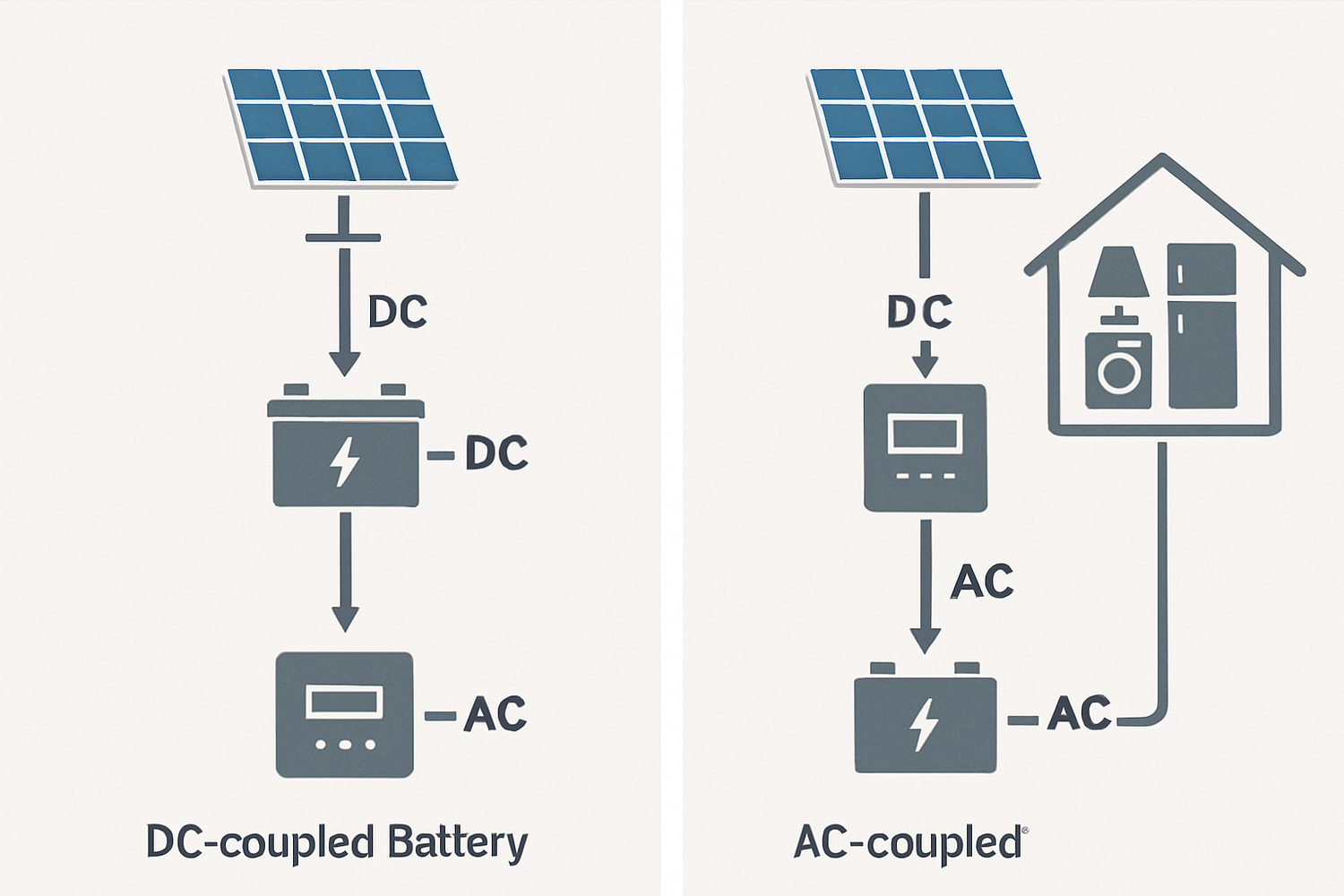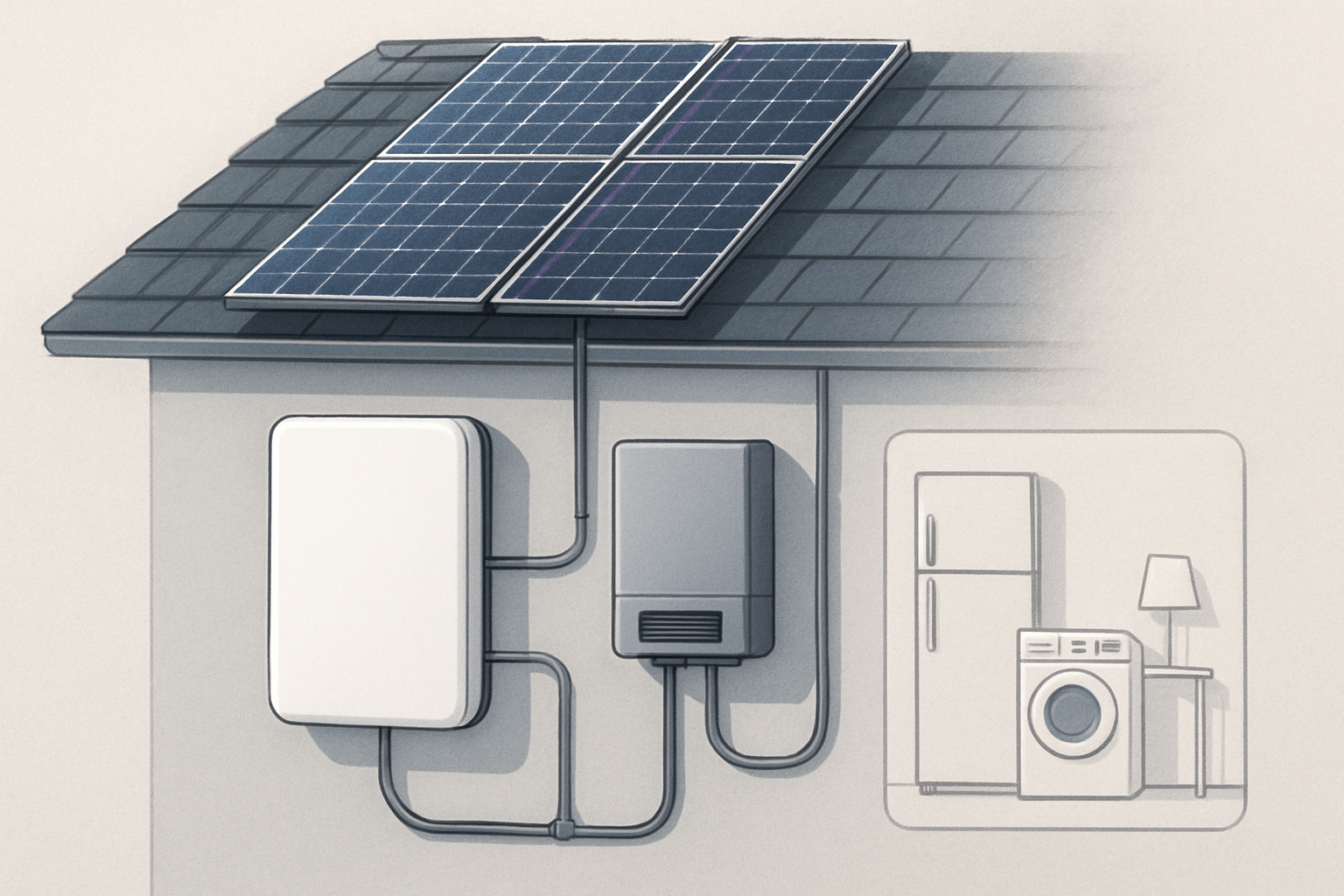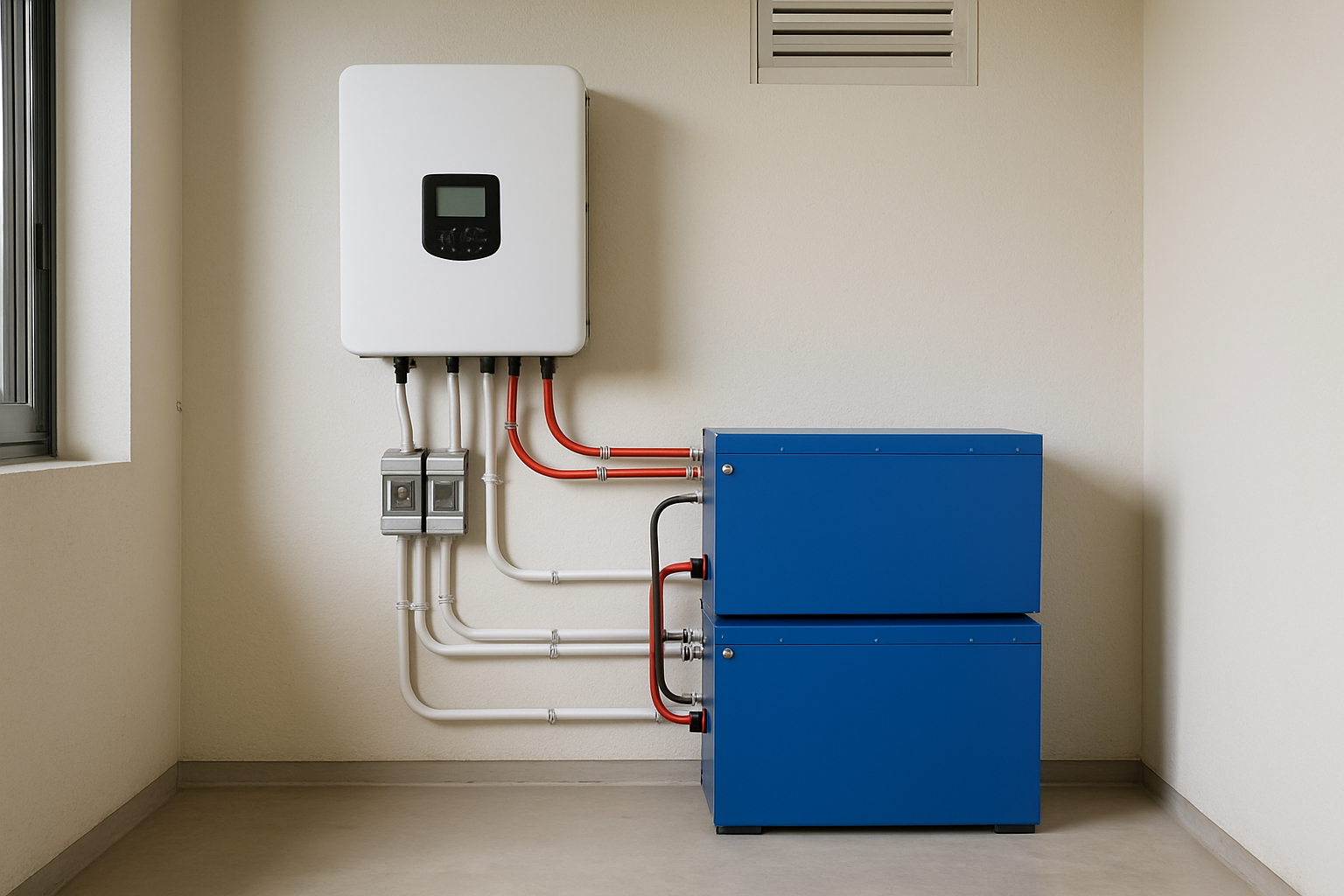Adding a battery to your solar panel system is a major step toward energy independence. It allows you to store the excess energy your panels generate during the day and use it at night or during a power outage. But as you plan your home installation, you'll encounter a critical technical choice: should you use an AC-coupled or a DC-coupled storage system? The answer depends entirely on your specific situation.
This guide breaks down the differences between AC and DC coupled storage. We will look at how they work, their efficiency, and the best applications for each. Making the right choice here is fundamental to building a reliable and efficient system. For many, this decision is the first real step to Unlock True Energy Independence with the Right Battery System.
1. The Fundamentals: How Solar Energy Powers Your Home
Before comparing system types, it's helpful to understand the two kinds of electricity involved. This knowledge is the foundation for every solar and storage decision you'll make.
From Sunlight to Your Appliances
Your solar panels produce Direct Current (DC) electricity when sunlight hits them. However, your home's appliances, from the refrigerator to your television, run on Alternating Current (AC) electricity. The bridge between these two is the inverter, a device that converts DC power into usable AC power. Every solar installation has at least one.
Where the Battery Connects
A solar battery, much like your solar panels, is a DC device. It charges and discharges DC electricity. The core difference between AC and DC coupled systems is *where* and *how* the DC power from the battery is integrated into your home's electrical system. This connection point dictates the system's efficiency, cost, and complexity.
2. DC-Coupled Storage: The Direct and Efficient Path
In a DC-coupled system, the energy flows in a more direct line. It’s a streamlined architecture that is often favored for new installations where all components are chosen to work together from the start.
How a DC-Coupled System Works
In this setup, the DC power from your solar panels travels through a solar charge controller, which manages the flow of electricity to your battery. The panels, charge controller, and battery all operate on the DC side of the system. A single, specialized hybrid inverter then converts the DC power from either the panels or the battery into AC power for your home. This is a common design in modern, all-in-one home energy storage systems that integrate the battery and inverter into a single unit.
- Energy Path: Solar Panels (DC) → Charge Controller (DC) → Battery (DC) → Hybrid Inverter → Home (AC)
The Efficiency Advantage
The primary benefit of DC-coupling is higher round-trip efficiency. Because the power only needs to be converted once (from DC to AC) when it's drawn from the battery, less energy is lost. The U.S. Department of Energy notes that every power conversion incurs some energy loss, so minimizing these steps preserves more of your valuable solar energy. DC-coupled systems typically achieve a round-trip efficiency of 90-95%. This efficiency is a key reason many people choose this setup, especially in off-grid applications where every watt counts. You can learn more about this in our detailed look at DC-Coupled Lithium Battery: The Efficiency Advantage Explained.
Best Applications for DC-Coupled Systems
From my experience helping homeowners design their systems, DC-coupling is the clear choice for:
- New Solar Installations: When you are installing panels, inverters, and batteries all at once, a DC-coupled system offers a seamless and highly efficient solution.
- Off-Grid Solar Solutions: For homes, farms, or cabins not connected to the grid, the superior efficiency of DC-coupling maximizes the use of generated power.
- Smaller Systems: The simpler architecture can make it a cost-effective choice for smaller residential setups.
3. AC-Coupled Storage: The Flexible Retrofit Solution
AC-coupling offers a different approach. It treats the solar panels and the battery storage as two separate, independent systems that share a common connection to your home's AC electrical panel. This modularity is its greatest strength.
How an AC-Coupled System Works
If you already have a grid-tied solar panel system, you have a solar inverter that converts your panels' DC power to AC. To add a battery, an AC-coupled system introduces a second inverter—a battery inverter. Excess AC power from your solar inverter is used to charge the battery, which requires converting it back to DC. When you need to use the stored energy, the battery inverter converts the DC power back to AC for your home.
- Energy Path (Charging): Solar Panels (DC) → Solar Inverter (AC) → Battery Inverter (AC to DC) → Battery (DC)
- Energy Path (Discharging): Battery (DC) → Battery Inverter (DC to AC) → Home (AC)
The Flexibility Factor
The main reason to choose an AC-coupled system is its flexibility. It is the ideal solution for retrofitting a battery into an existing solar installation because you don't have to replace the solar inverter you already own. This modular approach allows you to Future-Proof Your Home: Why Your Solar System Needs a Battery without overhauling your entire setup. You can add a battery from any compatible brand at any time.
Efficiency and Other Considerations
This flexibility comes with a trade-off in efficiency. The multiple power conversions (DC to AC, then AC to DC, and back to AC) result in greater energy losses. The round-trip efficiency for AC-coupled systems is typically in the range of 85-90%. While slightly lower, this is often an acceptable compromise for the convenience of upgrading an existing system. For a direct comparison of the two technologies, our guide on AC vs. DC Coupled Solar Battery: Which Is Best for You? provides further details.
4. A Direct Comparison: Choosing the Best Home Battery System
The decision between an AC vs DC storage for home setup is not about which is universally superior, but which is the right fit for your goals, budget, and existing equipment. Let's put them side-by-side.
Comparison Table
| Feature | DC-Coupled System | AC-Coupled System |
|---|---|---|
| Best For | New all-in-one installations and off-grid homes. | Retrofitting a battery to an existing solar system. |
| Round-Trip Efficiency | Higher (approx. 90-95%) due to fewer conversions. | Lower (approx. 85-90%) due to more conversions. |
| System Complexity | Often simpler with an integrated hybrid inverter. | More components (two inverters), but modular. |
| Installation | Generally more straightforward for a new system. | Simpler for adding to an existing system. |
| Backup Power | Excellent. Often designed for seamless backup power. | Good, but performance can depend on the inverter setup. |
The Importance of Modern Battery Technology
Regardless of the coupling method, the battery itself is the heart of your storage system. Modern Lithium Iron Phosphate (LiFePO4) batteries are an excellent choice for either architecture. They offer a long lifespan, superior safety, and a high depth of discharge, allowing you to use more of the stored energy. As you can see in this Case Study: Upgrading to a LiFePO4 Battery Storage System, the right battery technology makes a significant difference. The International Energy Agency (IEA) has noted the rapid growth in battery storage deployment, driven by falling costs and performance improvements that make systems like these more accessible to homeowners.
Making Your Final Decision
To find the best home battery system for you, start by answering a few key questions:
- Do you already have solar panels installed? If yes, an AC-coupled system is almost always the most practical and cost-effective choice.
- Are you installing a completely new solar and storage system? If yes, a DC-coupled system is a strong contender for its higher efficiency and integrated design.
- Is maximizing every watt of stored energy your top priority? If so, the efficiency gains of a DC-coupled system will be very appealing.
These questions are a great starting point. For a more structured approach, you can follow our How to Choose Your Home Energy Storage: A 5-Step Guide. To truly understand what to expect from your system, it's also important to get familiar with key metrics. This ultimate reference on solar storage performance offers valuable data on what to look for.
5. Looking Beyond the Hardware
Choosing between AC and DC coupling is a major part of the process, but it's not the only factor. A successful home installation also depends on quality installation and a clear understanding of the long-term value.
Installation and Long-Term Value
A DC-coupled system might involve simpler wiring for a new build, while an AC-coupled system requires careful integration with your home's existing AC panel. In either case, working with a certified professional is crucial for safety and performance. It's also important to address common misconceptions. For instance, some believe DC-coupled systems are only for off-grid use, which isn't true; they are highly effective in grid-tied homes as well. We clear up more points like this in our article on 7 Common Myths About Home Battery Storage Systems Debunked.
Ultimately, your investment in a solar storage system is about long-term value. According to the International Renewable Energy Agency (IRENA), the costs for residential solar PV have become increasingly competitive, providing homeowners with a viable way to manage energy costs. By selecting a reliable and scalable energy solution, you are not just installing hardware; you are investing in decades of energy security and financial savings.
Your Path to Energy Independence
The choice between AC-coupled and DC-coupled storage is not a matter of one being definitively better than the other. The best solution is the one that aligns with your specific circumstances. If you are adding a battery to an existing solar array, an AC-coupled system provides unmatched flexibility. If you are starting from scratch, a DC-coupled system offers superior efficiency in a streamlined package.
By understanding these core differences, you can work with your installer to design a system that meets your energy goals and budget. A well-planned home installation, built with high-performance components like LiFePO4 batteries, is a powerful asset that provides security and control over your energy future.
Disclaimer: The information provided in this article is for educational purposes only. It is not intended as financial or investment advice. You should consult with a qualified professional before making any decisions related to installing a solar and energy storage system.





Leave a comment
All comments are moderated before being published.
This site is protected by hCaptcha and the hCaptcha Privacy Policy and Terms of Service apply.